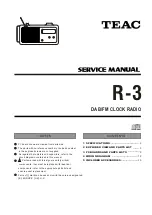
36
Final Gears and Hands
Parts
1 - 8-tooth gear (#29)
1 - 30-tooth gear (#39)
1 - 1 ½" dowel (prepared previously)
2 - Set washers (#34)
3 - Spacer washers (#49)
1 - Minute hand (#24)
32-tooth gear with hour pipe (previously installed)
Assembly Procedure
It is not necessary to remove the clock from the wall to perform the next steps.
The ends of the 1 ½" dowel will be inserted into the 8-tooth and 30-tooth gears. Check these fits and
sand the arbor ends as needed to permit the dowel to be able to press-fit onto the 8-tooth and 30-tooth
gears.
Slide the 1 ½" dowel through the open shoulder washer in the front frame. On the interior side of the
front frame, place a spacer washer on the 1 ½" dowel followed by the 30-tooth gear (the 30-tooth gear
meshes with the 10-tooth gear above it. On the outside of the front frame, slide two spacer washers
onto the 1 ½" dowel, followed by the 8-tooth gear. Be sure the gears are not pinching the frame, but
instead have some clearance to allow the arbor to spin freely.
Slide a set washer onto the great wheel arbor, positioning it about 1/8" from the front frame. Slide the
32-tooth gear (with hour pipe) onto the great wheel arbor, followed by another set washer. Leave some
clearance so the hour pipe will be free to rotate on the arbor. Finally, slide the minute hand onto the
great wheel arbor.
Both hands are friction fit so they can be repositioned. If the fit it too tight, some sanding may be
required. If the fit is too loose, remove the hand and apply a thin film of glue to the surface where the
hand was. Allow to dry completely and then replace the hand.








































